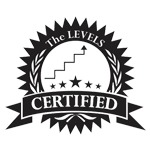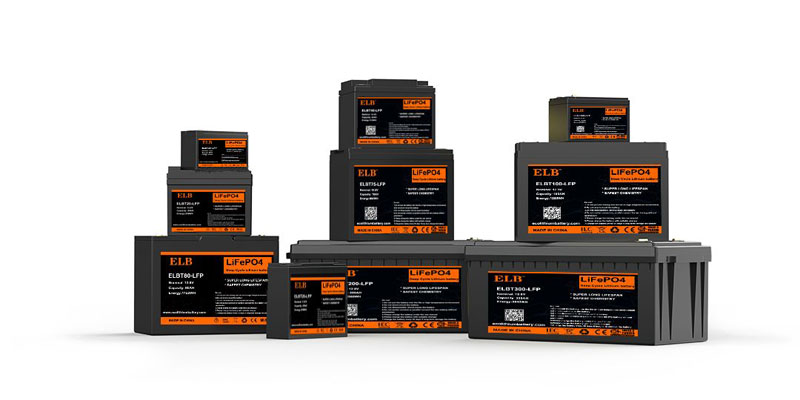
What is general purpose batteries?
In our life, according to different application scenarios, we divide batteries into car batteries, RV batteries, golf cart batteries, and solar energy storage batteries. However, there are many unknown areas that also require the use of batteries. They have no specific purpose, nor do they stipulate which scene they must be used in, so we call these multi-purpose battery as general purpose batteries.
For example, Some batteries used in elevators, also some batteries for home alarm systems, etc.
Types of general purpose batteries
Zinc metal batteries
Zinc metal batteries uses zinc ions as the charge carriers. Specifically, ZIBs utilize Zn as the anode, Zn-intercalating materials as the cathode, and a Zn-containing electrolyte. Currently Zinc-Carbon is cheapest in the markets and are used as power supply railway signal equipment and button-type batteries to run low power devices like clocks and calculators.
Alkaline batteries
Alkaline battery is a type of primary battery, that derives its energy from the reaction between zinc metal and manganese dioxide especially. The alkaline battery gets its name because it has an alkaline electrolyte of potassium hydroxide. At the same time, Alkaline batteries have a higher energy density and longer shelf life, yet provide the same voltage.
These general purpose battery you can get from any shop and available for most appliances and also gives minimum issue. But these alkaline batteries are also not good for high power devices and such devices will quickly deplete them.
Lithium metal batteries
Lithium metal batteries use lithium metal as an anode. Most lithium metal batteries are non-rechargeable. But they are high energy density batteries and can have more power. These batteries show less leaks and more safer, and are lighter in weight also.
Nickel cadmium batteries
Nickel cadmium battery is a type of rechargeable battery using nickel oxide hydroxide and metallic cadmium as electrodes. A Ni-Cd battery has a terminal voltage during discharge of around 1.2 volts.They have similar energy density as of the zinc batteries, and also supports high power applications.
Nickel metal hydride batteries
Nickel metal hydride battery is a type of rechargeable battery. Normally, NiMH batteries can have two to three times the capacity of NiCd batteries of the same size, with significantly higher energy density. Also environmentally friendly and also lower in cost. They have higher power than lithium and have high drain applications like camera etc.
Lead-acid batteries
Lead-acid batteries have gone through decades of market research. Sealed lead-acid battery are available in lead, lead dioxide, sulfuric acid, lead sulfate and aqueous solutions. They have a lower upfront cost, but don’t last as long as other battery options (3-5 years with little maintenance).
Sealed lead-acid batteries are heavy, can only discharge to 50% without damaging the battery. And last only about a 10th as long as their lithium counterparts.
Lithium-ion batteries
A lithium-ion battery is the most famous invention in recent years, which have limit to the application and covers many other portable devices. These batteries use lithium ions between two electrodes while charging and discharging.
Although lithium batteries are more expensive because of their Lead-acid versatile features, you can’t find their match in power and efficiency. The 4000 charge cycles confirm the long-life span and reliability of these batteries. Unlike other batteries, lithium ion batteries have a shallow self-discharge rate and can use for long time. In addition, they don’t require regular maintenance as compared to lead-acid.
Working principle of general purpose batteries
As we mentioned above, the general purpose batteries have many type, this part we will emphasize the working principle of lithium battery.
Lithium Battery Structure
The following picture to show the internal structure of the battery.
Nearly all lithium batteries are Consists of 3 main parts—— Cells, BMS, Housing. The Bracket only plays the role of fixing the battery. So I will not focus on bracket in this article.
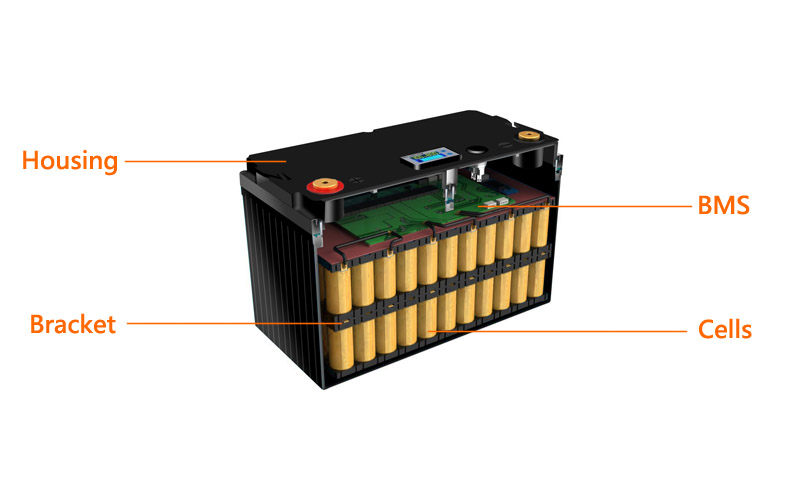
Working Principle Of Lithium Cells
Lithium-ion uses a anode (negative electrode) , an cathode (positive electrode)and electrolyte as conductor.
The anode of a discharging battery is negative and the cathode positive.
A separator creates a barrier between the cathode and anode, preventing the electrodes from touching while allowing electrical charge to flow freely between them.
The cathode is metal oxide, and the anode consists of porous carbon. During discharge, the ions flow from the anode to the cathode through the electrolyte and separator. Charge reverses the direction and the ions flow from the cathode to the anode.
Below picture illustrates the process.
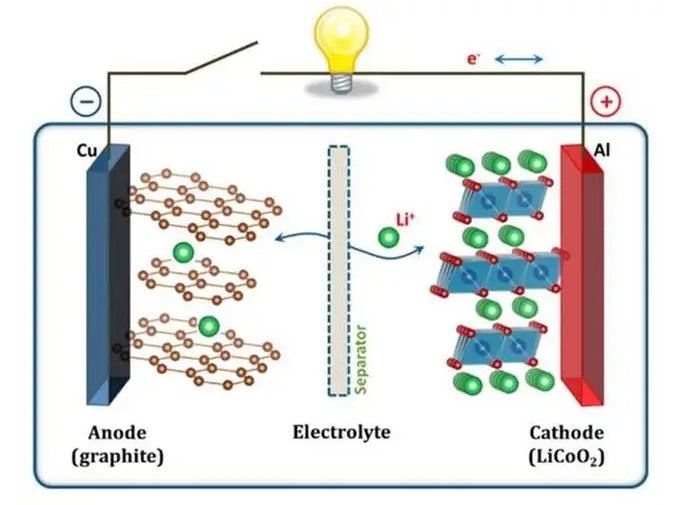
BMS
Battery management system (BMS) is technology dedicated to the oversight and management of the lithium battery pack.
Further more,the function of BMS are main included,
- Detecting battery temperature and balance current
- Providing battery protection
- Caculating the battery’s operational state
- Continually optimizing battery performance
- Reporting operational status to external devices
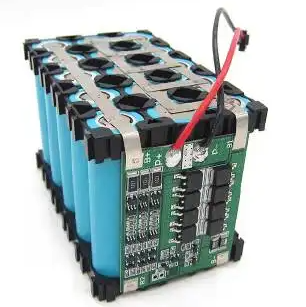
Which battery is the best general purpose batteries?
The best general-purpose batteries usually perform differently depending on the usage scenario.
For example. Alkaline batteries are the best when you’re wearing an electronic watch, don’t require recharging, and are built to last.
However, lithium batteries are currently the most popular on the market. Generally speaking, today’s new energy vehicles, energy storage batteries, and forklift batteries are gradually replaced by lithium-ion batteries. Because they have a long life, high power, store a lot of energy, also can support a series of advantages such as fast charging. ( Related article: 《Benefits Of Lithium Batteries》)
Application field of general purpose batteries
As we mentioned above, there are no special application, you can use them for your backup power of emergency light, also you can use them for your daily use, and power your home appliance etc. You can visit ELB product center to see if there are any general purpose batteries you may interested.
Where I can sourcing general purpose batteries?
ELB can provide lithium general purpose batteries, you can check the product center, but if you need the nickel cadmium batteries or lithium metal batteries, you can consult other manufacturer. If there are any special requirement, welcome to consult ELB technical team to get more information.
Related article
1. 《Top 10 Lithium Battery Manufacturers in China》
2.《Top 10 Solid State Battery Companies》


